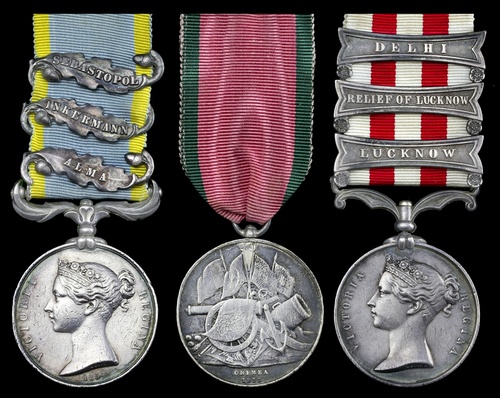
Auction: 19002 - Orders, Decorations and Medals
Lot: 79
(x) The outstanding 'Relief of Lucknow' group of three awarded to Major A. M. Fawcett, 2nd Dragoon Guards, late 9th Lancers and 50th Foot, who commanded a squadron of the 9th Lancers during their famous exploits in the Indian Mutiny
During the assault on Delhi on 14 September 1857, the 9th Lancers advanced into the enemy's killing zone to draw rebel fire while the infantry attacked the breaches; such cold courage earned them the nickname 'The Delhi Spearmen'
Fawcett commanded the 9th Lancers at Allyghur and Meraigunge, having several horses shot from under him; his stamina and energy throughout the campaign is revealed in Brevet Major Anson's Letters, a first-hand account of the Mutiny
Crimea 1854-56, 3 clasps, Alma, Inkermann, Sebastopol (Capt. A. Fawcett. 50th Regt.), naming officially engraved by Hunt & Roskell in large serif capitals; Indian Mutiny 1857-59, 3 clasps, Delhi, Relief of Lucknow, Lucknow (Capt. A. M. Fawcett, 9th Lancers); Turkish Crimea 1855, British issue, 'Captn. A. Fawcett. 9th Lancers' engraved around rim, heavy contact marks and edge wear, nearly very fine, a scarce combination (3)
Anthony Molloy Fawcett was born in Dublin in 1832. He was gazetted an Ensign in the 50th (Queen's Own) Regiment of Foot on 16 April 1852, purchasing his Lieutenancy on 28 January 1853. He embarked with the 50th to the Crimea and was present at the Battles of Alma and Inkermann, and the Siege of Sebastopol. He was promoted to Captain on 12 January 1855. Part of Brigadier-General Sir John Campbell's Brigade of Sir Richard England's 3rd Division, the 50th took part in the first assault on the Redan on 18 June 1855.
Transferring to the 9th (Queen's Royal) Lancers, Fawcett accompanied the Regiment to India and served with it during the Indian Mutiny, first seeing action at the Battle of Bundlekeserai on 8 June 1857. During this action, the small British column under Sir Henry Barnard defeated a rebel force of 9,000 men and 30 guns (David, 2002), clearing the path to Delhi. Throughout the ensuing Siege, the 9th Lancers were repeatedly required to work the batteries due to the shortage of gunners. Tasked with overseeing the camp's piquets, Fawcett had little respite and was exposed to the sun for hours on end. He had his horse shot from under him while repelling a rebel sortie on 19 June.
Fawcett receives several mentions in Brevet Major O. H. S. G. Anson's celebrated Letters from an Officer of the "Delhi Spearmen" on campaign in India, an important eyewitness account of the Siege of Delhi. He comes across as a humorous character: on 5 August, having been out peacock shooting, he distributed bottles of eau-de-cologne among brother officers to 'drive away the stench at the picquet' (Anson, p. 66). During the main assault on Delhi on 14 September, the 9th Lancers bravely took up position in the enemy's killing zone, in front of the city walls, to draw the enemy's fire while the infantry attacked the breaches. Anson recorded that some forty men of the Regiment were killed in this way.
After the Siege, Fawcett again had horses shot from under him during the actions of Bolunshir and Allyghur. He was the senior officer of the Regiment when the enemy attacked at Allyghur, and he commanded it during the early part of the engagement and in the action at Meraigunge. Throughout these battles the 9th Lancers proved a deadly fighting force, earning the nickname 'The Delhi Spearmen'.
Fawcett was present at the Relief of Lucknow by Lord Clyde on 14-15 November, the Battle of Cawnpore on 6 December, and the actions of Seraighat and Khudagunge. He commanded a squadron at the Siege of Lucknow from 2-19 March 1858, and throughout the summer campaign in Oudh and Rohilkhund. He was present at the actions of Rhodomow and Allygunge, the capture of Bareilly, the action at Shahjehanpoor and the pursuit to Mahomdee. The 9th Lancers won twelve Victoria Crosses during the Indian Mutiny, and have been described as: 'The beau ideal of all that British Cavalry ought to be in Oriental countries' (Tsouras, 2015).
Fawcett was gazetted a Major, by purchase, in the 2nd Dragoon Guards on 1 May 1866. On 3 September 1880 he was placed in the Reserve of Officers. He died in 1901.
Recommended reading:
Anson, H. S., With H.M. 9th Lancers during the Indian Mutiny, the Letters of Brevet-Major O.H.S.G. Anson (Naval & Military Press, 2004).
Subject to 5% tax on Hammer Price in addition to 20% VAT on Buyer’s Premium.
Sold for
£3,800
Starting price
£1900




